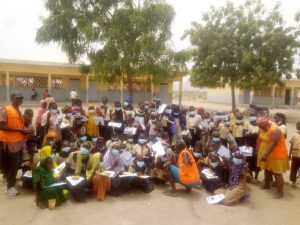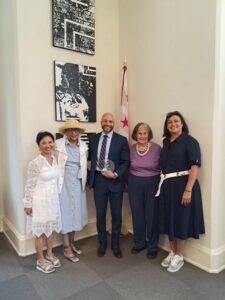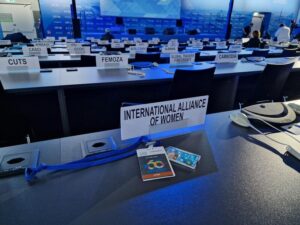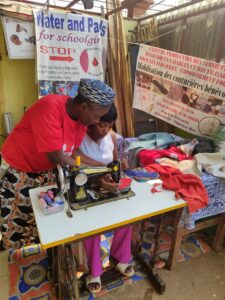 “The Water and Pads project for schoolgirls is a wonderful project. We can even call it a revolutionary initiative that is really changing the mindsets within the communities. Gradually it is dispelling shame and taboos around the periodic bleeding. The project also helps to keep girls in school and to have good menstrual hygiene, because now they can use sanitary pads during their periodic bleeding and feel comfortable at school…”
“The Water and Pads project for schoolgirls is a wonderful project. We can even call it a revolutionary initiative that is really changing the mindsets within the communities. Gradually it is dispelling shame and taboos around the periodic bleeding. The project also helps to keep girls in school and to have good menstrual hygiene, because now they can use sanitary pads during their periodic bleeding and feel comfortable at school…”
These are the enthusiastic words of Anne Yotchou, Coordinator of CEFAP in Cameroon after the third successful event at Medjo Primary School.
It is thanks to our deeply committed IAW colleagues in Africa and Asia that despite all hardships caused by the pandemic the WP project can move on unabated.
At the first look, this is very astonishing because in 2020 people in developing countries of Africa or Asia were particularly hard hit by Covid. Due to severe lockdowns, women were stuck in overcrowded habitations. They could not sell the crops of their small fields, vegetables, or fruits on the local markets. Goma Bastola from RUWON Nepal wrote about this dramatic situation: With no income, their families were literally starving. Due to the lockdown, many schools were closed, and many girls, being at home, were more than ever exposed to violence and unwanted pregnancies.
Our IAW colleagues also wrote to us that out of utmost hardship many girls were forced into marriages…
Looking more closely we can well understand that our IAW colleagues fighting strongly against the pandemics also voiced their great concerns about the dangerous situation of the schoolgirls.
Therefore already at the end of last year, some of them got in touch with “their” schools.
Ruhi Sayid from APWA Punjab Pakistan, Anne Yotchou from CEFAP Cameroon and Anuarite Siirewabo from SOFEDEC DR Congo carried out some WP activities. Unfortunately in DR Congo, the team had suffered a life-threatening attack by armed gangs.
In 2021 also Rita Marque from WCCF Zimbabwe, Quinta Kah from RENATA Cameroon and again Anuarite Siirewabo from DR Congo could successfully implement the 2020 activities which had been postponed.
The WP project is clearly very much needed. In fact, it turns out that some school directors had urged our IAW colleagues to start again with the WP activities as soon as possible. For them particularly now it is essential that the schoolgirls can attend classes instead of anxiously hiding at home. They trust IAW as an international organization with its reliable booklets about menstruation. They have now established a good relationship with the IAW member organizations and are thankful for their professional approach.
Since the start of the pandemics, our IAW colleagues had to follow the Covid-precautions strictly.
So now wherever a WP event is being planned they organize the necessary disinfectant, masks etc. This is usually very much appreciated by the parents of the children and is also an excellent goodwill action for the whole community.
Where are we now?
At least seven IAW organizations answered our recent questionnaire. They try to move on despite the ongoing pandemic, and they have started their detailed planning for the WP events in “their” schools for 2021.
By now each organization has found its own way about how to implement best this educational goal. It turns out that in some places it may be safer printing the booklets locally, in other regions the costs would be horrendous. Some of our IAW colleagues would like to have booklets in the local native language – unfortunately, an unreachable goal for us!
Although the WP project is primarily addressing girls it also got the interest of the boys in various mixed schools. At some places they were spontaneously invited to attend the lectures about menstruation. Rita Marque from WCCF observed at Epworth High School that the male pupils were positively astonished about the biological cycle of women. They even organized a boys’ club that will enhance the respect for their female classmates!
Most IAW organizations want to also provide pads during their WP activities. We are aware that in Africa often there is a scarcity of water, but even so usually reusable pads are preferable.
Giving washing instructions is difficult, because of the lack of sanitary infrastructure, and no money to improve the situation. But this did not discourage Anuarite Siirewabo, when she was standing beside the most lamentable toilets at Bunyakiri. She explained the importance of hygiene to the pupils and established a “toilet-committee” with representatives of each class working together with the person responsible for maintenance!
All over our IAW colleagues absolutely want to keep the WP project going on in future. It is for all of them a very convincing way of raising awareness about sexual and reproductive health.
Some of them are planning a cooperation with small businesses producing reusable pads or with local printing shops editing the booklets etc. – the best ways towards sustainability and well-being of the girls and young women!
Our biggest challenge – finding the necessary finances for the future! At the moment we hope that we can get a specific donation which would enable us to include three new projects, one with LA COLOMBE in Togo, and the others in Cameroon.
Gudrun Haupter and I are very happy that Heidi Bodmer with all her experience in project management has joined us in our WP team.
Why don’t you visit the Water and Pads website? There you can read interesting reports and see pictures of all events.
12.05.2021 U.Nakamura


